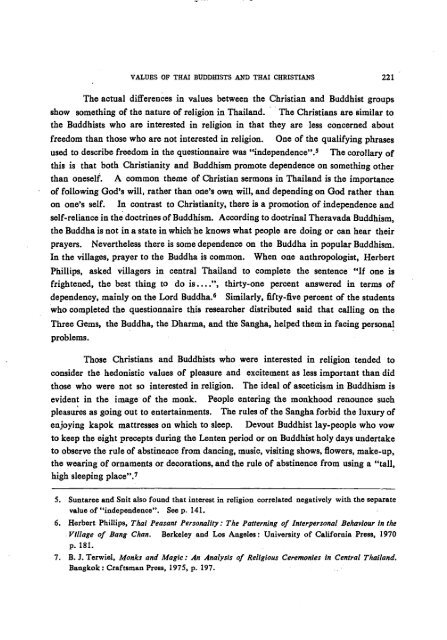The Journal of the Siam Society Vol. LXXII, Part 1-2, 1984 - Khamkoo
The Journal of the Siam Society Vol. LXXII, Part 1-2, 1984 - Khamkoo
The Journal of the Siam Society Vol. LXXII, Part 1-2, 1984 - Khamkoo
You also want an ePaper? Increase the reach of your titles
YUMPU automatically turns print PDFs into web optimized ePapers that Google loves.
VALUES OF THAI BUDDHISTS AND THAI CHRISTIANS 221<br />
<strong>The</strong> actual differences in values between <strong>the</strong> Christian and Buddhist groups<br />
show something <strong>of</strong> <strong>the</strong> nature <strong>of</strong> religion in Thailand. · <strong>The</strong> Christians are similar to<br />
<strong>the</strong> Buddhists who are interested in religion in that <strong>the</strong>y are less concerned about<br />
freedom than those who are not interested in religion. One <strong>of</strong> <strong>the</strong> qualifying phrases<br />
used to describe freedom in <strong>the</strong> questionnaire was "independence".5 <strong>The</strong> corollary <strong>of</strong><br />
this is that both Christianity and Buddhism promote dependence on something o<strong>the</strong>r<br />
than oneself. A common <strong>the</strong>me <strong>of</strong> Christian sermons in Thailand is <strong>the</strong> importance<br />
<strong>of</strong> following God's will, ra<strong>the</strong>r than one's own will, and depending on God ra<strong>the</strong>r than<br />
on one's self. In contrast to Christianity, <strong>the</strong>re is a promotion <strong>of</strong> independence and<br />
self-reliance in <strong>the</strong> doctrines <strong>of</strong> Buddhism. According to doctrinal <strong>The</strong>ravada Buddhism,<br />
<strong>the</strong> Buddha is not in a state in which· he knows what people are doing or can hear <strong>the</strong>ir<br />
prayers. Never<strong>the</strong>less <strong>the</strong>re is some dependence on <strong>the</strong> Buddha in popular Buddhism.<br />
In <strong>the</strong> villages, prayer to <strong>the</strong> Buddha is common. When one anthropologist, Herbert<br />
Phillips, asked villagers in central Thailand to complete <strong>the</strong> sentence "If one is<br />
frightened, <strong>the</strong> best thing to do is ....", thirty-one percent answered in terms <strong>of</strong><br />
dependency, mainly on <strong>the</strong> Lord Buddha. 6 Similarly, fifty-five percent <strong>of</strong> <strong>the</strong> students<br />
who completed <strong>the</strong> questionnaire this researcher distributed said that calling on <strong>the</strong><br />
Three Gems, <strong>the</strong> Buddha, <strong>the</strong> Dharma, and th'e Sangha, helped <strong>the</strong>m in facing persona~<br />
problems.<br />
Those Christians and Buddhists who were interested in religion tended to<br />
consider <strong>the</strong> hedonistic values <strong>of</strong> pleasure and excitement as less important than did<br />
those who were not so interested in religion. <strong>The</strong> ideal <strong>of</strong> asceticism in Buddhism is<br />
evident in <strong>the</strong> image <strong>of</strong> <strong>the</strong> monk. People entering <strong>the</strong> monkhood renounce such<br />
pleasu;es as going out to entertainments. <strong>The</strong> rules <strong>of</strong> <strong>the</strong> Sangha forbid <strong>the</strong> luxury <strong>of</strong><br />
enjoying kapok mattresses on which to sleep. Devout Buddhist lay-people who vow<br />
to keep <strong>the</strong> eight precepts during <strong>the</strong> Lenten period or on Buddhist holy days undertake<br />
to observe <strong>the</strong> rule <strong>of</strong> abstinence from dancing, music, visiting shows, flowers, make-up,<br />
<strong>the</strong> wearing <strong>of</strong> ornaments or decorations, and <strong>the</strong> rule <strong>of</strong> abstinence from using a "tall,<br />
high sleeping place". 7<br />
5. Suntaree and Snit also found that interest in religion correlated negatively with <strong>the</strong> separate<br />
value <strong>of</strong> "independence". Seep. 141.<br />
6. Herbert Phillips, Thai Peasant Personality: <strong>The</strong> Patterning <strong>of</strong> Interpersonal Behaviour in <strong>the</strong><br />
Village <strong>of</strong> Bang Chan. Berkeley and Los Angeles: University <strong>of</strong> California Press, 1970<br />
p. 181.<br />
7. B. J. Terwiel, Monks and Magic: An Analysis <strong>of</strong> Religious Ceremonies in Central Thailand.<br />
Bangkok: Craftsman Press, 1975, p. 197.

















